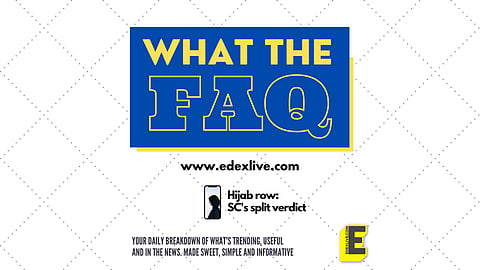

We are more than 60 days away from entering New Year 2023 and the incident which started in December 2021 has not found its conclusion yet. The incident which started in a Government PU College in Udupi, Karnataka, reached the doors of the Supreme Court. And today, October 13, a split verdict was delivered by the Bench with regards to a batch of appeals filed against the Karnataka High Court (HC) judgement.
To recall, a group of six female students claimed that they were not allowed to enter the classrooms wearing the hijab. Following this, they held a press conference alleging that even after taking permission, the college authorities refused to allow them to enter the classrooms with their faces covered. This incident led to protests against college authorities and later, turned out to be a massive state-wide protest. Adding to the burning fire, counter-demonstrations were staged involving saffron scarves. The students of the two communities engaged in verbal arguments which included shouting slogans of 'Jai Shri Ram' and 'Allah hu Akbar'. The videos of protests and such incidents were viral across social media for quite some time.
Having said that, what does one understand when we say the bench delivered a split verdict? And what is the timeline of events? #WhatTheFAQ will brief you about this and other details.
What does a split verdict mean?
A split verdict is delivered when both judges have differences of opinion in the case and hence, the judgement is not unanimous. In such a case, the case is passed on to a third jurist. But in the Karnataka Hijab row, the matter has been placed before the Chief Justice of India. As per LiveLaw.in, "In light of the divergence of opinion, the matter has to be placed before the Chief Justice of India for appropriate directions."
What is the timeline of events at court?
From the streets of Udupi to the whole state and later, in front of the court, the issue has reached the doors of the top court of India for justice. Also, several petitions were filed in Karnataka High Court (HC) on January 31 where Muslim students sought the right to wear hijabs in classrooms under Articles 14, 19 and 25 of the Constitution of India.
February 8: The high court heard the case for the first time
February 11: Court passed an interim order prohibiting students from wearing religious clothing: hijab, saffron stoles, scarves and so on
February 26: Karnataka High Court reserved the matter which means that the court took time to consider the facts and details of the case before agreeing upon a verdict.
March 15: Giving its final verdict, the Karnataka HC dismissed the petitions filed by the students and ruled that wearing a hijab is not an essential religious practice.
Further, challenging the HC's verdict, several pleas were filed in the Supreme Court.
September 22: The apex court concluded the hearing of the hijab case and reserved the judgment after ten days of the hearing. And today, a bench of Justices Hemant Gupta and Sudhanshu Dhulia delivered a split verdict on a batch of appeals against the Karnataka HC judgment, as per a tweet by LiveLaw.in.
What are hijab-related incidents across the world?
On Tuesday, September 13, Mahsa Amini, a 22-year-old Kurdish woman was detained on her way to her relative’s place in Tehran for allegedly disregarding Iran’s laws related to the dress code for women in the country. It sparked a storm of rage throughout the country on Friday, when she was declared dead after three days of slipping into a coma following her arrest. Videos and photos of a bruised and unconscious Amini in a hospital bed made rounds on social media.
Countries like France banned hijabs to remove religious symbolism in public spaces. This was followed by protests by Muslim women who wore the hijab by choice and considered the law as an infringement of personal liberty. Turkey also witnessed a decade-long hijab ban that was later restored by the Erdogan government.
